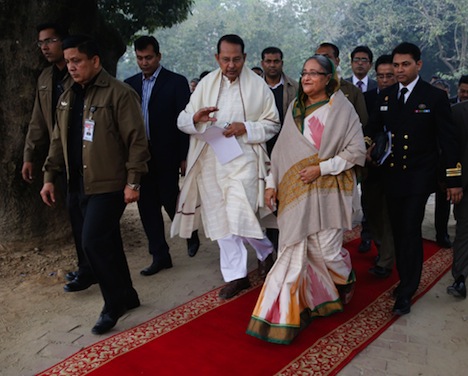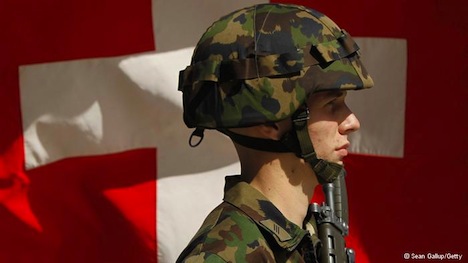They’re both located in south/southeastern Asia, they share female prime ministers, and they share the dubious distinction of being the two troubled elections that kick off 2014’s global election season. ![]()
![]()
Though there’s little reason otherwise to link Bangladesh’s January 5 general election with Thailand’s February 2 vote, there are uncanny similarities. In both countries, the main opposition parties are boycotting (or have boycotted) the election, the governing party is set to win the election, leaving each country in a political crisis with no easy apparent solution. In both cases, the electoral crisis has its roots in a struggle that dates back over a decade, and in both cases, the military hasn’t been shy about intervening in the past.
In Bangladesh over the weekend, prime minister Sheikh Hasina’s governing Bangladesh Awami League (বাংলাদেশ আওয়ামী লীগ) won 232 of the 300 seats in the country’s Jatiyo Sangshad (national parliament). The opposition, more Islamist Bangladesh Nationalist Party (BNP, বাংলাদেশ জাতীয়তাবাদী দল) refused to participate in the vote, and it lost all of its seats. Ostensibly, the BNP and its leader, former prime minister Khaleda Zia refused to take part in the vote due to Hasina’s refusal to appoint a caretaker government to oversee the elections. But the reality is much more difficult — the BNP has carried out a campaign of attrition through general economic strikes, protests and sometimes violence to protest Hasina’s government. Hasina (pictured above, top) has responded with an increasingly authoritarian tone, and Zia and other third party leaders have been detained or put under house arrest. The political violence comes against the backdrop of the controversial execution of Islamist leader Abdul Quader Mollah for war crimes relating to the country’s 1971 war for independence, and unresolved matters from the 1971 war tribunal (including the previous life imprisonment sentence for Quader Mollah) led to massive protests in Dhaka’s Shabagh Square in early 2013. Violence related to the election has already cost hundreds of lives and unknown damage to the Bangladeshi economy and the garment industry that dominates the country’s exports.
In Thailand, prime minister Yingluck Shinawatra has called snap elections in response to protests against her government that initially sprang from opposition to a proposed amnesty bill that would have pardoned top political leaders from both major parties for political violence over the past decade. Yingluck’s populist Pheu Thai Party (PTP, ‘For Thais’ Party, พรรคเพื่อไทย), however, holds a nearly unbreakable lock on Thai politics, due to the popularity of Yingluck and her exiled brother, former prime minister Thaksin Shinawatra, in northern and northeastern Thailand. The opposition Phak Prachathipat (Democrat Party, พรรคประชาธิปัตย์) refused to take part in the elections and is instead calling for an unelected council to govern.
In both cases, the opposition parties are actively banking on military intervention — an outcome that would undermine the fragile democratic institutions and rule of law in both countries, which have each made gains in reducing poverty over the past decade. The Thai Democrats and its leaders, former prime minister Abhisit Vejjajiva and former deputy prime minister Suthep Thaugsuban, knew they had no chance to win the February election and believe that under a military government, they will have more influence. Zia, who has been Hasina’s chief political rival since the 1980s, has never much trusted Hasina. Game theory might teach you that three decades of ‘repeated games’ between the BNP and the Awami League would make a negotiated settlement easier. But the BNP no longer has any faith in Hasina’s government to carry out fair elections, so the longtime animosity between Zia and Hasina may actually raise the costs of a deal. So the BNP may actually prefer the military to the Awami League at this point.
What’s next?
The international community is already pressing Hasina hard to call new elections, and there’s even a precedent for how Bangladesh can walk out of the current impasse. When Zia was prime minister in February 1996, she called snap elections that the Awami League boycotted — voter turnout barely exceeded 20% and the BNP on all 300 seats. After a period of negotiation between the two parties, however, fresh elections were held in June 1996, the BNP lost power and the Awami League won a minority government. The Bangladeshi tradition of appointing a caretaker government prior to elections, in fact, comes from the 1996 political settlement between the BNP and the Awami League. Continue reading How Bangladesh could influence next month’s Thai election



